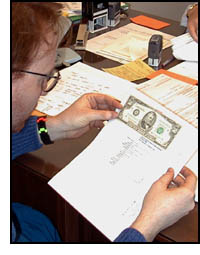








Transcript of Von Holt, Part 2
Why become a Secret Service agent?
April 8, 1999
Note: Transcripts have been edited for readability and are not word-for-word reflections of the audio sections.
Mark "The Red" Harlan:We've talked about how you become an agent, a bigger question is why would you want to become an agent?
Chris Von Holt:Well that's a really good question because I think you'll find the answer varies from person to person you talk to on the job. There is, I think, a certain allure to the protection side of things. You'll see the men and women in dark blue suits and red striped ties that are running next to the limo on TV, but that's only a small percentage of what we do -- most of our work is investigative. So I think the job has a certain mystique, which is interesting to some people.
If you start looking around at jobs and do a serious study of where you want to work, and you start talking to the people that are on those various jobs, the people that work with various agencies, I think you'll find our reputation is for having a good group of people. I think most of the people wanting to work here are attracted to that. Initially they might say they were attracted to the job, but when it really came down to it, they were attracted to the people on the job. I hate to use the word "family" -- that it is a Secret Service family -- but there is something to that. It is a fairly tight group of people that get along well on and off the job with each other. That probably is the main attraction for most people.
RED:Why did you join?
CVH:I was in law school when I was looking for job opportunities. I really didn't know what I wanted to do. I found the civil side of law somewhat boring, and if you go to the criminal side there's really only two real issues: are you going to be on the defense, or are you going to be on the prosecution? It takes a certain mind-set to be a defender of people you know are criminal. I couldn't do that myself, although I have nothing against the people who do, so I looked into the District Attorney's office and found those jobs to be ... I don't know ... a little boring. I knew a lot of cops. A lot of the cops I knew just from growing up with them, from playing softball with them, suggested looking into federal law enforcement. So I applied with us, with the FBI, a couple of other agencies, and just wound up here. It was kind of lucky because after being involved with this for about 16 years, I feel that I fit in better here personality-wise and I find this to be an interesting job with a good group of people. I'm happy I wound up here as opposed to anyplace else.
RED:That's great. It sounds as though you like what you do.
CVH:I do. I enjoy the job and the people on the job. Which is not to say it isn't a tough job, because it is. Actually what we do isn't that hard, but it's hard on the people that work here. The hours are hard and long, you take a lot of transfers. You may be in San Francisco this year but two or three years from now you may end up somewhere else. It's difficult on your social life, your family life, and it's stressful at times. So it's a tough job in that way, but it's not though in the sense that we're cracking any atoms here.
RED:(Laughs) Right. How about your mom? You call up your mom and say, "Mom, I'm going to be a Secret Service Agent?"
CVH:Well my mom is very supportive of me, and would be supportive, I'm sure, of anything I did. I think she initially found it a little bit scary, at least in the early stages when I was out in the street a little bit more and more apt to get into a difficult situation.
Although we don't get into the same situations that the real cops do. We're not wearing uniforms, we're not getting into a one-on-one situation where it's very dangerous. So we have a lot less threat against us than actual police officers do.
|
|
Want to email this to a friend? Send them the URL for this page: http://www.geekradio.net/v2.0/why_become_agent.t.html Having technical problems with the site? Email the webmaster. Looking for something specific? Peruse the site map. Copyright (c) 1999 Polterzeitgeist Productions |





